The Bergen line to Oslo across Norway is considered one of the great rail journeys of the world. I made the 7.5 hour trip on Monday, September 15 riding a bus from Bergen to Voss due to rail maintenance and then picked up the train in Voss for the remaining six hours and nearly 400 km of the journey to Oslo. The western portion of the trip is the more dramatic scenery as you travel from the narrow fjords of western Norway around Bergen to the glacial plateau of the Hardangervidda through a barren rock landscape of treeless high alpine country at 3,500 to over 5,600 feet in central southern Norway. The rail line peaks out at just over 4,000 feet on the Hardangervidda Plateau around Finse, Norway.
Part one of my Bergen Line Railway travel with photos.
Hardangervidda is a large mountain plateau with a rugged alpine landscape. Finse is a popular launching point for wilderness hikes into the region. In 1981 Hardangervidda was designated a national park, Norway’s largest at 1,321 square miles (3,422 sq. km). Norway’s largest wild reindeer herd lives in the Hardangervidda with a population estimated around 8,000 migrating animals between the east and west sides of the park region. I have read these reindeer are weary of humans and hard to spot on the Hardangervidda from the road and train. I did not see any reindeer. This is also reindeer hunting season in Norway.
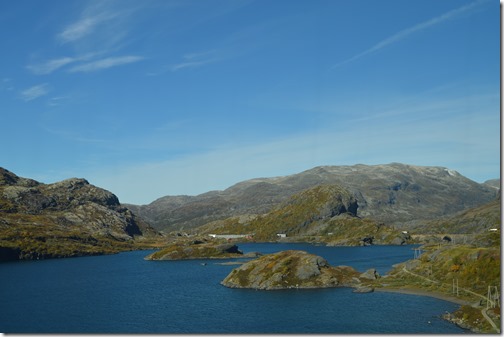
Hallingskeid is 1,110 meters (3,642 feet) in elevation.
Hardangerjøkulen is the sixth largest glacier in mainland Norway located about a few miles south of Finse.
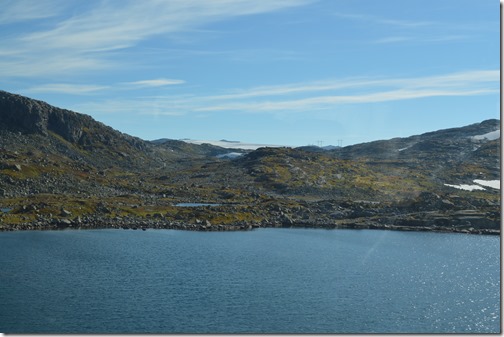
I read Finse 1222 Hotel with 42 rooms is one of Norway’s historic hotels constructed and opened in 1909 in the early years of the Bergen Line railway. The hotel is known for its fine dining and remote location on the Hardangervidda as a launching point for wilderness hikes.
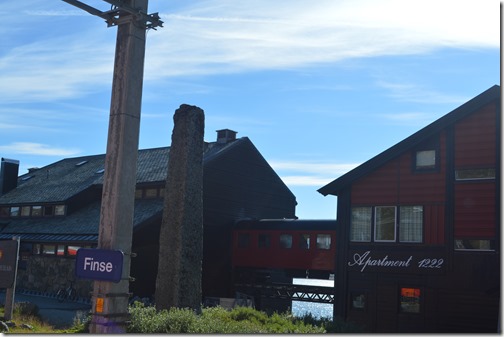
Hotel 1222 in Finse is a unique place to spend some hotel time in Norway if the opportunity arises. I was curious about the train carriage between the buildings and now, after reading the history of 1222, the train car makes historical sense. Finse is 1,222 meters in elevation (4,009 feet) and the highest station stop on the Bergen Line.
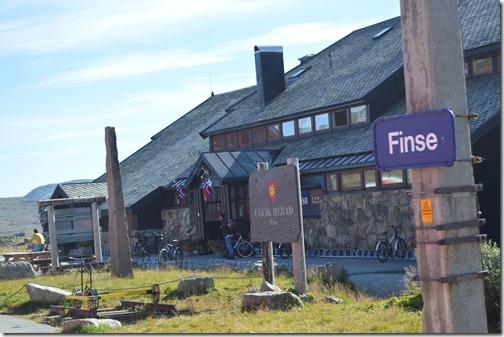
The landscape around Finse is quite a contrast to the fjords in the west and the forests to the east on the Bergen Line.
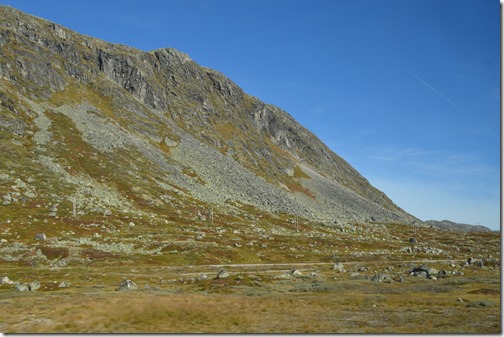
Only about ten miles east of Finse are the first signs of trees. Mid-September fall colors were apparent in the deciduous leaves.

Within a few more miles the harsh alpine landscape changed completely to lakes and forest as the train descended off the Harangervidda Plateau only 20 minutes east of Finse.
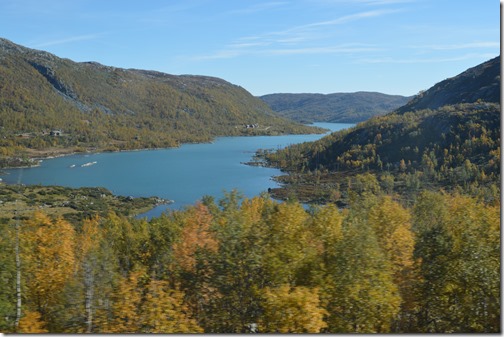
This area is south of Hallingskarvet nasjonalpark (see you can read Norwegian). The train stopped at Haugastøl where the rail track meets up with the highway running through the area beside the large body of water known as Sløddfjorden.
The rugged alpine landscape was not totally out of sight as the train passed by a barren rocky plateau in the distance, a few kilometers east of Haugastøl.
I think this is Hallingskarvet National Park in the distance.
An isolated and remote home reminded me of a modern day pioneer cabin. About 95% of Norway is wilderness in a country the size of California. Most of Norway’s population of 5,050,000 live in about 25 cities. Lillehammer, site of 1994 Winter Olympics, is the 20th largest city in Norway with a population of only 21,000.
East of Geilo, about an hour from Finse, the landscape entered timber country. This part of Norway reminded me of the redwood country of northwestern California with dense forest cover and lumber mills.
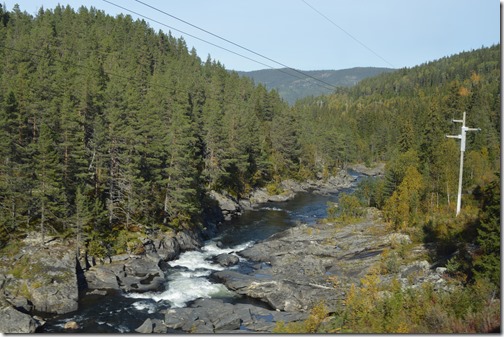
Geilo is a ski resort area at 794 meters (2,605 ft.) in elevation on the edge of the Hardangervidda Plateau.
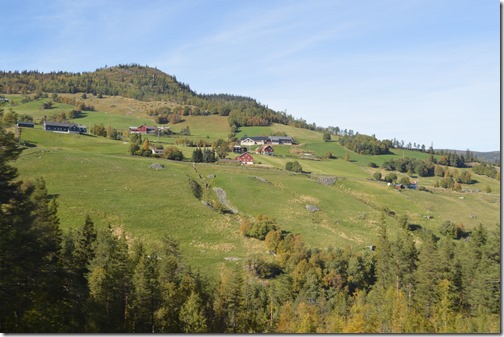
The landscape turned bucolic with sheep grazing in pastures beside hillside houses in the forest. The pastures are a byproduct of the timber industry harvesting the region.
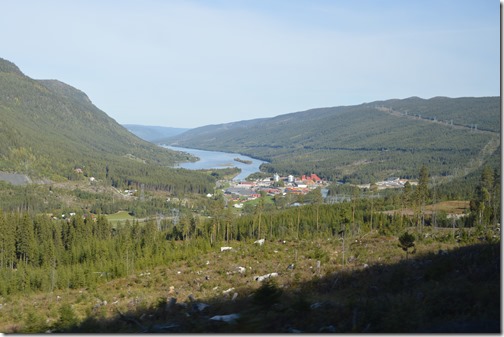
The signs of logging are a landscape all too familiar to me as a resident of California’s redwood empire for more than a decade.
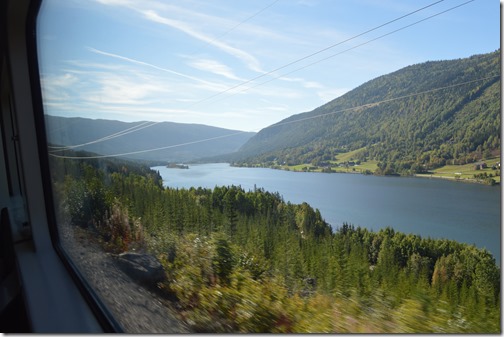
Just a reminder for readers these photos are from a rail journey looking out the window. I was in a Komfort Class carriage that cost an extra 90 NOK ($15) for a seat. I moved from my seat to a cabin with only one other passenger so I could bounce from one side to the other snapping photos. This photo is a few kilometers west of Ål, Norway.
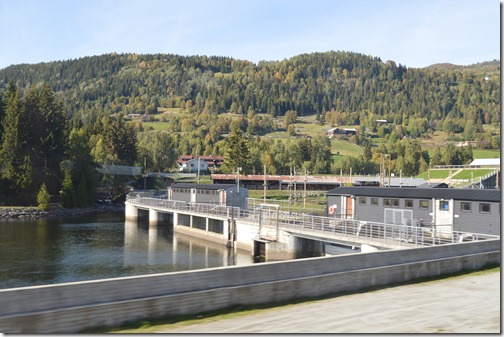
The elevation in Ål is only 436 meters (1,430 feet) and the rest of the way to Oslo is similarly forested along a series of lakes and rivers. There was a small hydroelectric dam at Ål. I laughed seeing holiday cabins next to the electrical units beside the river. 99% of Norway’s electricity needs are produced by hydroelectric plants.
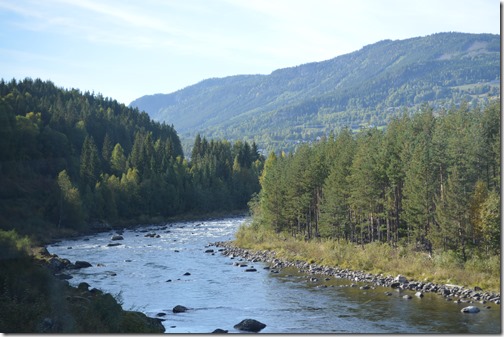
River near Gol, Norway.
As we passed by Nesbyen, Norway the train was only 150 km from Oslo. The sun was sitting just over the mountains and shadows were covering more of the landscape making it harder to get decent photos through the window glare.
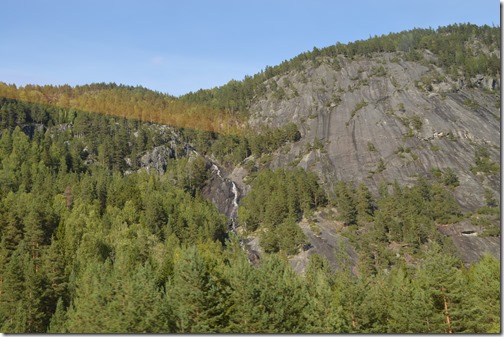
Houses were more frequent and civilization nearby the rail line. Oslo is the part of Norway where nearly half the country’s population lives. Even though we were still two hours from Oslo, the landscape did not change too much from forest and lakes until reaching Drammensfjord and Oslofjord. Many places looked like holiday home getaway retreats.
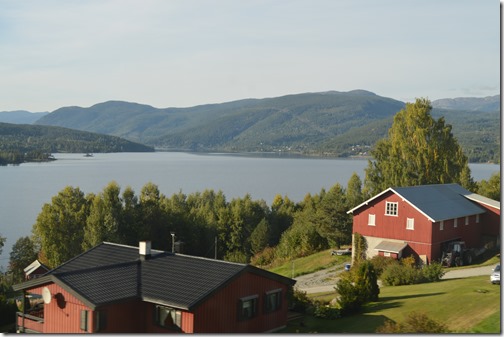
Homes by a lake.
Vikersund on the Tyrifjorden is a scenic spot 90 km from Oslo.
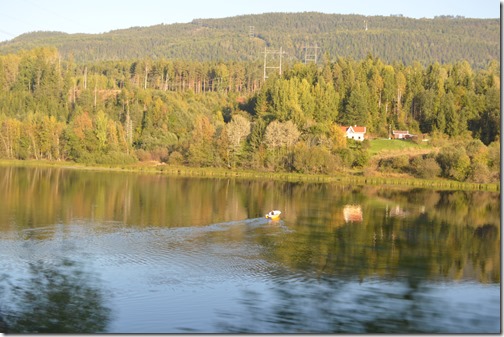
Next stop Drammen which is home to the Aass Brewery, the first Norwegian beer I had in 1984 when my wife and I attempted to drink 80 beers around the world at a pub during our first year at University of California Davis. We made it through 40 or so beers and then had to give up the effort when we could not afford to buy beer any longer on our part-time college work study jobs. I had a flashback to my college days and remembered that first Norwegian beer when I saw Aass Bryggeri, Norway’s oldest brewery from 1834 on the banks of Drammensfjord as the train went through the city near Oslo.
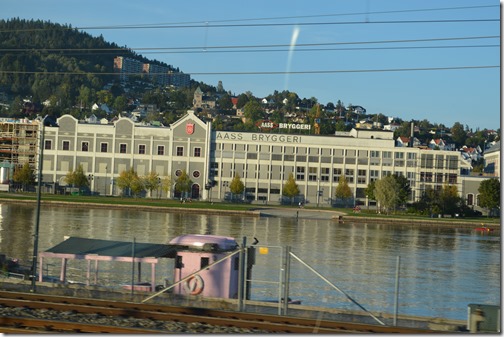
Soon the train arrived at Oslo Sentralstasjon. 7.5 hours from Bergen to Oslo with perfect weather across Norway and many photos to remember the journey of places I saw from the bus and train on a sunny summer September day.
I exited Oslo Central Station for the 25 minute walk to the modern and upscale Aker Brygge waterfront to check-in at The Thief Hotel for my last two nights in Norway. The Thief is Oslo’s #1 TripAdvisor rated hotel since it opened in 2013. And that is another journey to share in another post about two weeks in Norway.
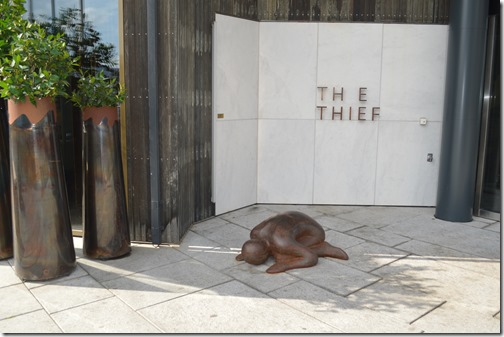
*****
Ric Garrido of Monterey, California is writer and owner of Loyalty Traveler.
Loyalty Traveler shares news and views on hotels, hotel loyalty programs and vacation destinations for frequent guests. Check out current hotel loyalty program offers across all the major chains in Loyalty Traveler’s monthly hotel promotions guide.
Follow Loyalty Traveler on Twitter and Facebook and RSS feed.


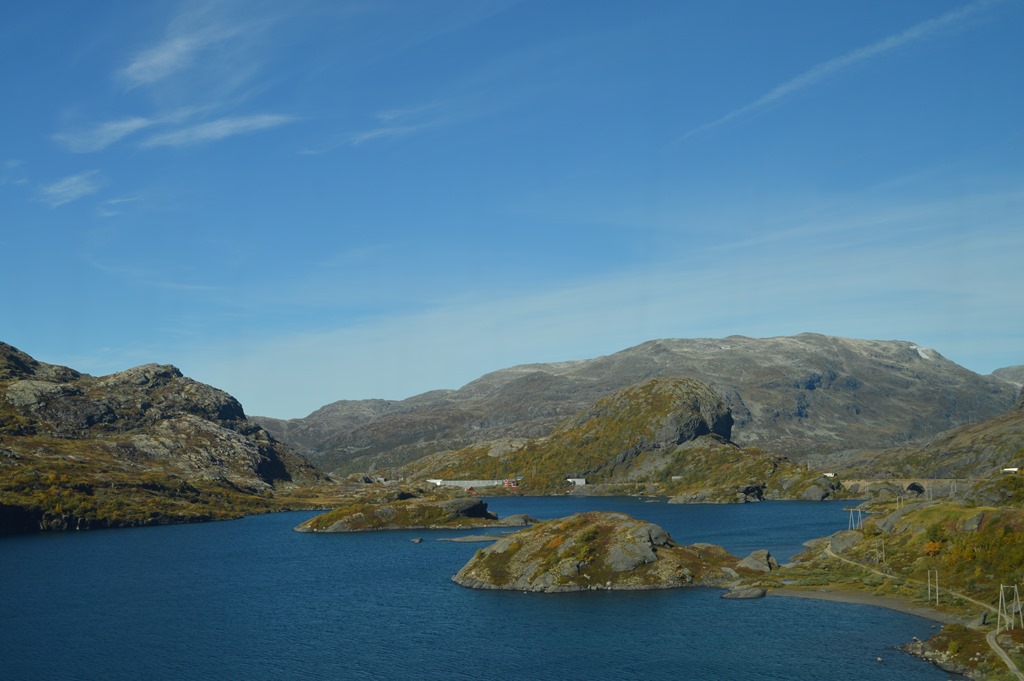
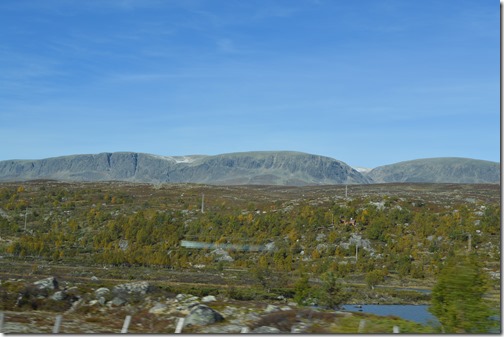
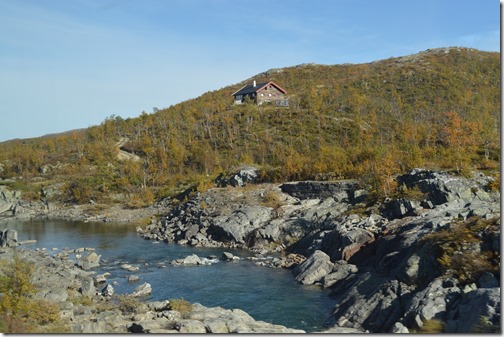
4 Comments
Comments are closed.